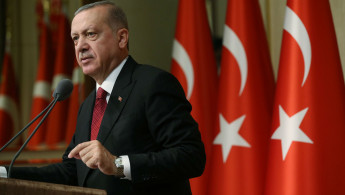Erdogan renews Syria 'air and ground' operation threat
President Recep Tayyip Erdogan on Saturday renewed Turkey's threat to launch an "air and ground" operation in Syria against a Kurdish militia viewed as terrorists by Ankara.
The president previously said that Turkey's patience was wearing thin after Turkish and American officials agreed in August to establish a buffer zone in northern Syria.
"We've made our preparations, completed our operation plans, given the necessary instructions," Erdogan said during a televised speech, adding that the offensive could start "as soon as today, tomorrow".
"We will conduct this (operation) on the ground and in the air," he added, saying it would be east of the Euphrates river.
Erdogan has repeatedly threatened to launch a cross-border offensive and recently suggested that progress on the zone with the US was not developing as Ankara wanted.
While there have been joint US-Turkey patrols, Turkey wants to urgently establish a "safe zone" for the return of up to two million Syrian refugees.
On Friday, tTe US-led coalition and Turkey conducted their third joint patrol in northeastern Syria amid renewed concerns the plan designed to defuse tensions between Washington's two allies - Ankara and the Syrian Kurds- may not be enough.
Turkish Defence Minister Hulusi Akar reiterated Ankara's stance that it won't accept delays in the creation of what it calls a "safe zone". Turkey could act alone to set it up, he said, reviving concerns about a possible Turkish military operation.
A senior Syrian Kurdish official said her group is taking the renewed Turkish threats seriously and called for measures to prevent an attack and the collapse of the agreement.
Pentagon spokesman Commander Sean Robertson said any "uncoordinated military operations by Turkey would be of grave concern as it would undermine our shared interest of a secure northeast Syria and the enduring defeat of" the Islamic State group.
Although Ankara and Washington agreed in August to carry out the joint patrols and remove Syrian Kurdish fighters from the borders, they still disagree on the size of the area along the Syria-Turkey border and who is to monitor it.
The Americans and the Kurds call the measures a "security mechanism".
The Friday patrol followed a telephone call late Thursday between Akar and US Defence Secretary Mark Esper in which Akar said Turkey would end the joint patrols "if there are distractions, delays," according to a statement from the Turkish Defence Ministry.
Akar urged the US to end its support of Syrian Kurdish fighters, who were the coalition's partners in the battle against Islamic State militants in Syria.
However, Ankara views them as an extension of a Kurdish insurgency within Turkey. It has repeatedly threatened to carry out a military operation to push the Kurdish fighters back from its borders.
'Terror corridor'
Turkey had carried out military incursions with allied Syrian groups in western Syria to drive out Kurdish fighters, as well as IS militants, and has stationed troops there.
But a Turkish military operation in northeastern Syria would carry a larger risk, bringing troops into a zone where at least 1,000 US soldiers are deployed.
Akar told his US counterpart that Turkey "would not allow the establishment of a terror corridor to its south".
The coalition said the patrol went ahead as planned and Turkey's Defense Ministry said it was in an area east of the town of Tal Abyad.
"Continued success of the security mechanism will prevent (IS) from remerging" while meeting the security interests of Turkey, said Coalition spokesman Colonel Myles B. Caggins III in a statement.
Washington says the deal reached in August aims to address Turkey's security concerns.
So far, fighters from the most prominent Syrian Kurdish group - the People's Protection Units or YPG - have moved away from border posts.
Turkish President Recep Tayyip Erdogan told parliament that Turkey plans to settle 2 million refugees in the zone and will hold a donors' conference to help build homes and infrastructure for them.
It was not clear how Turkey planned to move the largely Sunni Arab Syrians it is hosting from many parts of Syria into the Kurdish-dominated region, and whether the US is on board.
Follow us on Twitter: @The_NewArab





 Follow the Middle East's top stories in English at The New Arab on Google News
Follow the Middle East's top stories in English at The New Arab on Google News


